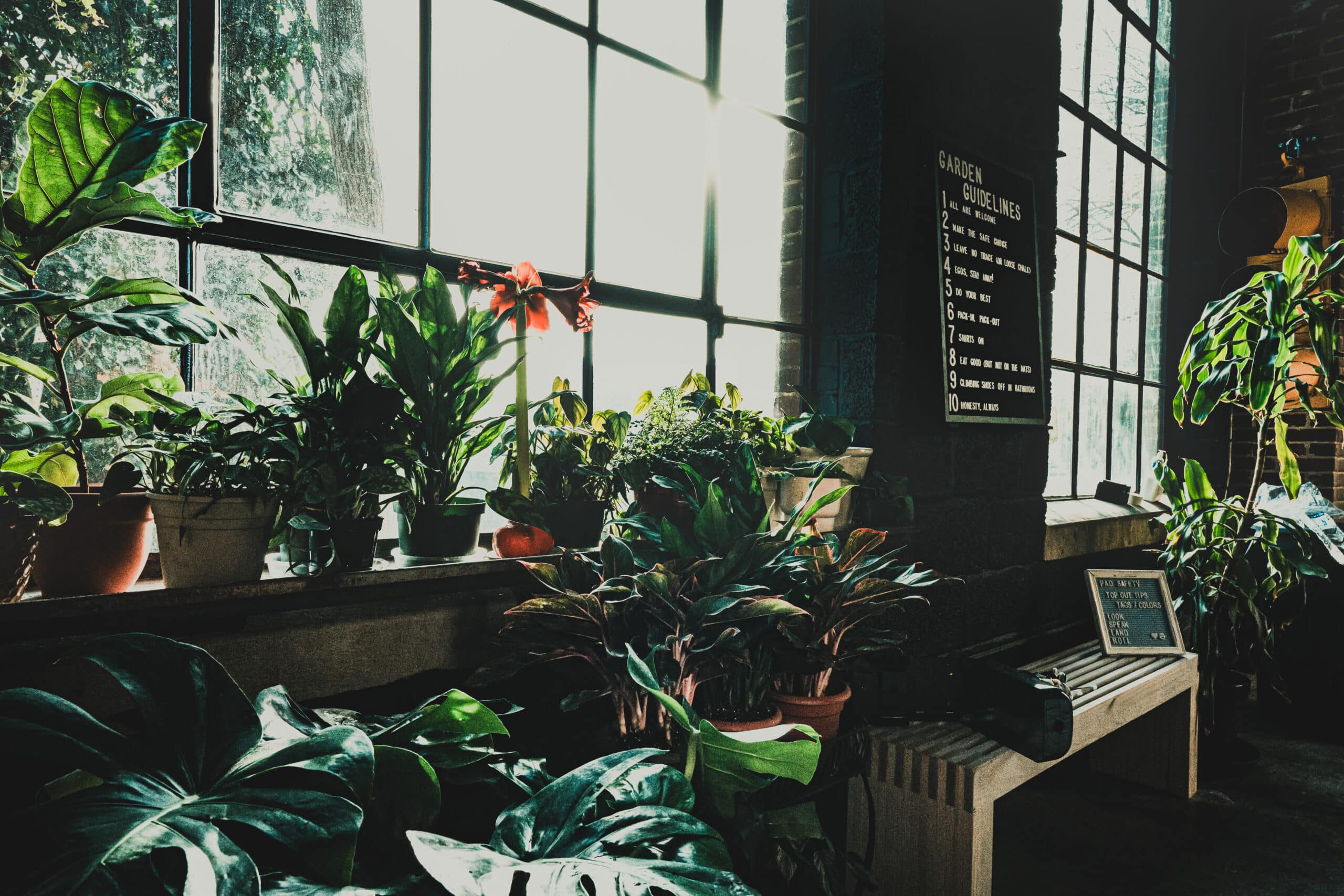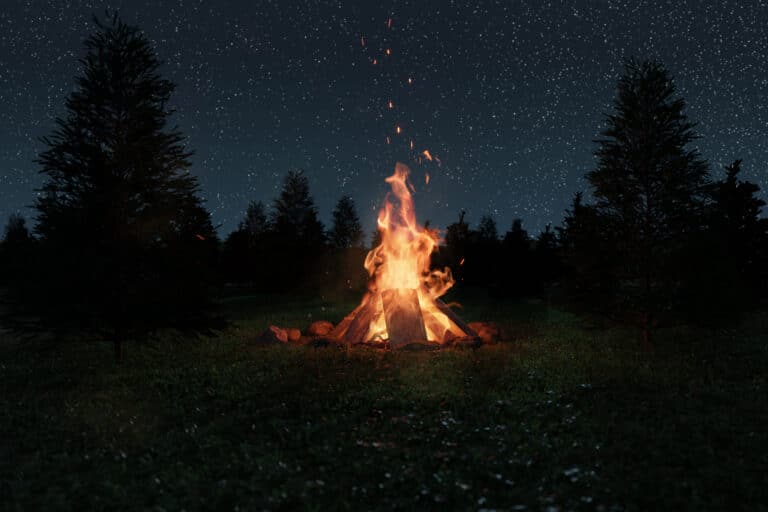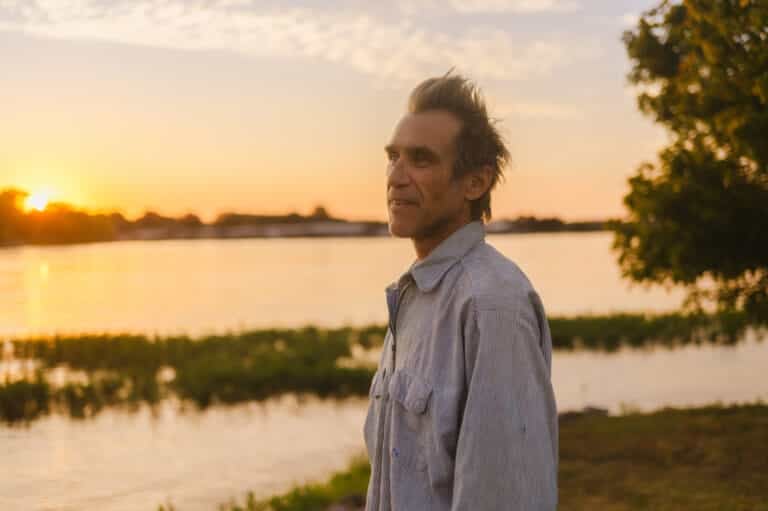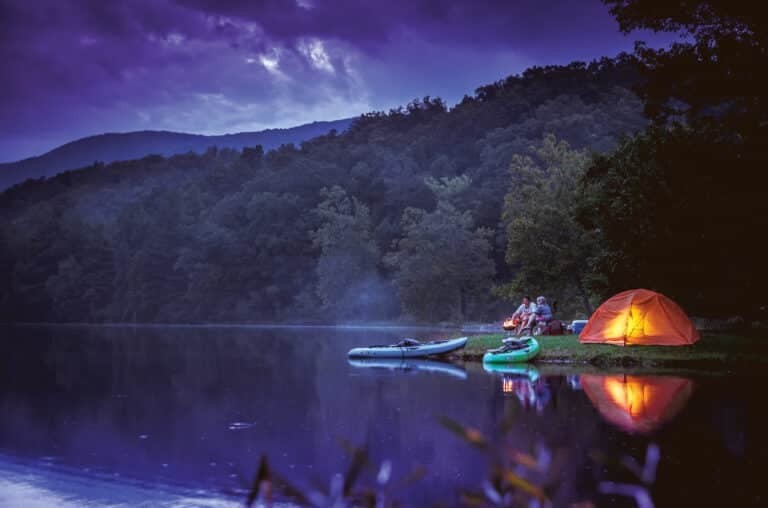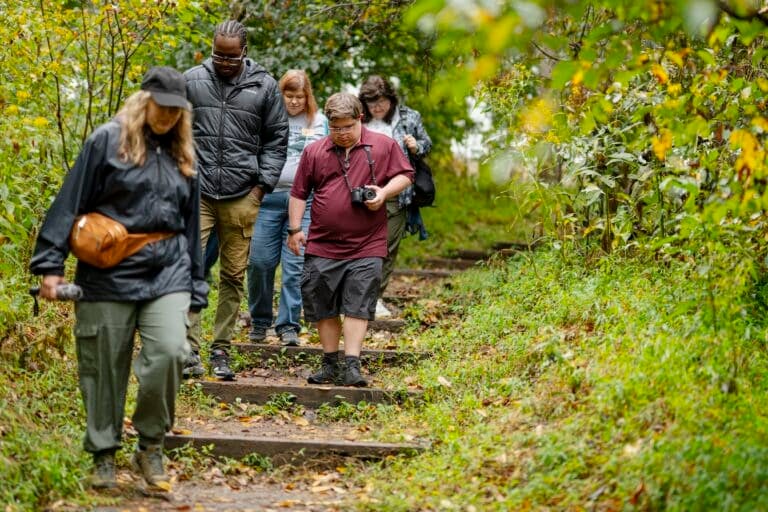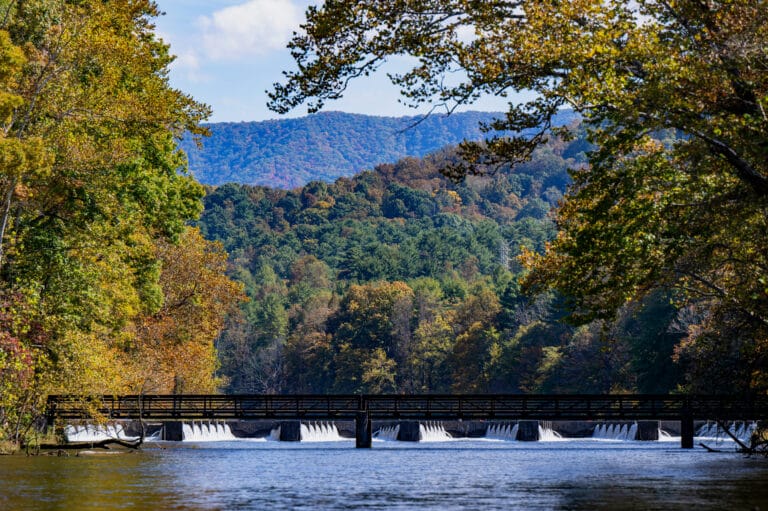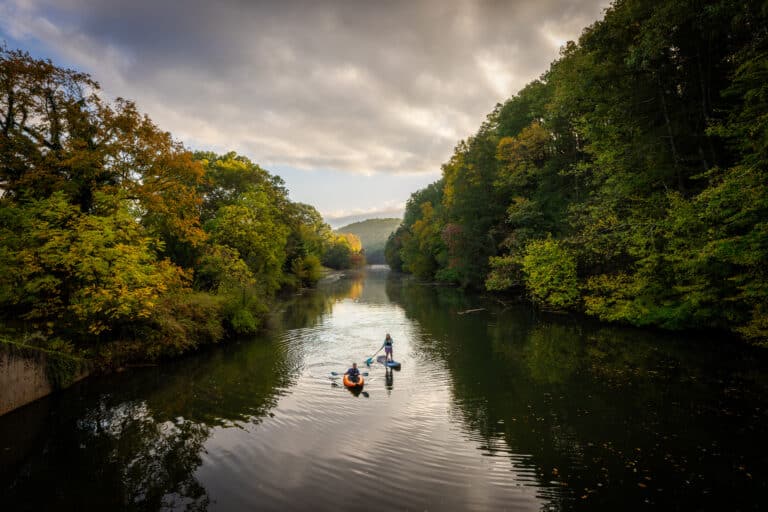A new North Carolina gym blends bouldering routes, an arts-forward vibe, and a whole lot of plants.
Outside an historic brick building in Durham, N.C., four garden beds line a gravel patio, planted with pollinator-friendly flowers and edible species like bee balm, coneflower, basil, mint, and Thai chili peppers. These plants are the first outwardly visible nods to the namesake of the Boulder Garden, a moody, soft-lit, greenery-filled rock climbing gym that has breathed new life into the old Durham Brazing and Welding building since last December.
Inside the gym are even more plants, a mini nursery of sun and shade-loving species either clustered in sunlight along the wall of windows at the street entrance or tucked into darker corners. There are monsteras, ferns, a fan palm, philodendron moonlight, and scattered pothos plants with trailing tendrils. One such pothos sits in the glass tank of Dyno, a 10-year-old ball python adopted by gym manager Katie Elliott (in climbing, “dyno” is shorthand for dynamic moves that involve swinging and springing from one set of hand and foot holds to another).
Davis brought all this nature into the Boulder Garden to highlight a building block of the gym’s identity: environmentalism. As he worked to fill the once-derelict building with psychedelic art, a welcoming community, and an island-like bouldering structure in the center of the brick-walled space, Davis knew he also wanted to make sustainability part of both the gym’s operation and its mentorship of a new wave of climbers. That motivation brewed years before Davis founded the Boulder Garden, when he was a North Carolina State University engineering student building wooden hangboards in the basement of his dorm.
In 2017, two years into his engineering studies, Davis felt the urge to make something. As a kid, he’d found ways to work with his hands, like building go karts, but his classes weren’t demanding much of that lately. Davis had been bitten by the climbing bug while working at NC State’s indoor climbing wall, and one night, after climbing at Triangle Rock and spotting hangboards in the gym’s store, he called his friend, Tate Sandman, with an idea: they could make their own. Climbers mount hangboards overhead and hang from their varied features—like shallow edges, bulbous slopers, and deep pockets—to build finger strength.
Davis worked on the hangboard using a CNC router in NC State’s Innovation Hall, shaving shapes into wood. “I broke many bits,” he remembers. “I caught many pieces of wood on fire. After five months of iteration, iteration, iteration, we made a product and started selling it.”
Davis knew he wanted to build a good range of features and removable bolt hangers into the hangboard. He was also set on making and distributing it using sustainable practices. He’d always felt strongly about practicing “pack in, pack out” principles outdoors, but his interest in environmental sustainability grew at NC State as he got involved in the university’s outdoor adventure program and took environmental science classes. So Davis and Sandman looked for ways to work sustainability into their production and packaging of Midnight, the name of their hangboard.
Operating under Acorn Climbing, a hat tip to Raleigh, the “City of Oaks,” they built the hangboards using Forest Stewardship Council-certified wood, purchased carbon credits to offset emissions from their tooling and transportation processes, and mailed the product out using biodegradable or low-impact packaging. They sold their first hangboard locally in October 2017.
Davis decided to wind down the time-consuming passion project of making hangboards when he graduated from NC State in 2020. He worked at two engineering jobs out of school, with the second role in Atlanta. In East Atlanta, he started working evening shifts at Wall Crawler Rock Club. It was then that Davis began thinking about starting a gym of his own back in Durham. “I was like, ‘This would be so cool to do myself,’” he says. “‘Could I actually do a project like this?’”
After spending a summer as a hang-gliding instructor in the Outer Banks to “live free and fun” before starting a business, Davis went on the hunt for a building. One day, he happened to walk by the Brazing and Welding building, noticing its ceiling height and what looked to be thick slab walls inside. He went down a GIS record rabbit hole to find its owner, which led to a deal with the building’s managing business that enabled him to rent the space following its renovation.
Davis chose to name the gym the “Boulder Garden” as a continuation of Acorn Climbing, with the plan to build on his first business’s interest in sustainability. He’s since looked for ways to do so throughout the space to dissuade overconsumption. The Boulder Garden goes light on retail, selling only the items climbers really need to make use of the gym—shoes, chalk, and brushes with virtually no packaging. There are no trash cans in the climbing area, which nudges members away from bringing and tossing plastic bottles. Davis also went secondhand with most of the furnishings and sourced reclaimed wood from Raleigh Reclaimed for the space. Many of the holds on the climbing walls are “seconds” from Vertical Solutions, with tiny imperfections that don’t affect safety, like discoloration. Some of the holds are made of leftover wood from construction as well.
Environmental stewardship also underpins the gym’s operation. Anyone who becomes a member of the Boulder Garden also gets a membership with the Carolina Climbers Coalition, to which the gym donates a portion of its monthly revenue. Davis says 40 percent of the gym’s members are new climbers, so when they head outside, they’ll have the resources to learn about their impact, minimize it, and help the coalition protect climbing areas. “If we’re getting a ton of new people into climbing, it’s a responsibility of ours to support our crags,” he says.
Looking ahead, Davis plans to host spring gardening classes in the gym’s outdoor space. He was able to picture it in July, watching summer camp kids water plants in the raised beds and pick the edible varieties. When they went inside to climb, the kids moved across boulders that basked in the glow of permanent art installations, including the pink-haired Unnamed Neon Lady (created by local art factory Hex Neon) and the gradient Crimson Wave 424 by Jan Kaláb. To Davis, the gym’s mind-bending art, growing community of climbers, and lush notes of green are all meaningful expressions of the Boulder Garden’s mission statement: “Climb, connect, inspire.”
Cover Image: The Boulder Garden is in downtown Durham, N.C. Photo by Chris Ocker
